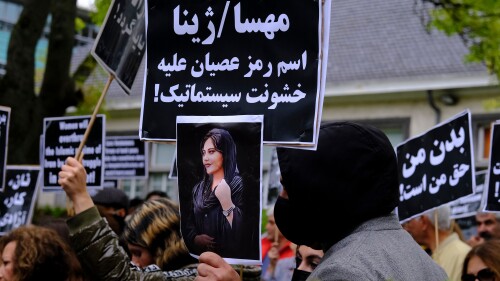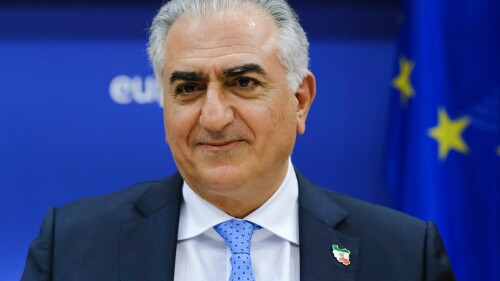Recent articles by Iranian Vice President and former Foreign Minister Mohammad Javad Zarif present Iran as a nation seeking peace and stability through diplomacy. He portrays the Islamic Republic as a rational actor open to reform and ignores the regime’s past efforts to use negotiations to advance its nuclear ambitions and solidify regional influence. Zarif does not try to hide this. Earlier this month, he bragged that Tehran can shape U.S. foreign policy to its advantage. In recent weeks, he has promoted Iran’s commitment to dialogue, even as it nears nuclear breakout.
Any American official should be wary of Zarif. As Iran’s foreign minister from 2013 to 2021, he lied repeatedly to shield the regime from accountability as the Islamic Revolutionary Guard Corps expanded its influence and operations. In a leaked audio recording, Zarif acknowledged he was merely a tool to clean up messes created by Supreme Leader Ali Khamenei and the Islamic Republic’s international messes. This candid admission should raise questions about the true agenda of the de facto lobbyists in Washington and Iran advocacy groups who promoted Zarif and helped propel his agenda in the West.
Tehran uses insincere diplomacy as an asymmetric warfare strategy to advance its malign activities.
In the past, groups like the National Iranian American Council (NIAC) did a lot of the regime’s heavy lifting in Washington. While NIAC may say it received neither funding nor direction from Tehran, its meetings with Zarif appeared to set a conformity of views in subsequent advocacy. For this reason, among others, many in Congress and the executive branch view NIAC as discredited. Subsequent exposures of Iran’s clandestine nuclear sites and its nuclear archives show that President George W. Bush was right about the regime’s character and ambitions. NIAC, however, succeeded in confusing dialogue and assessments in Washington until the regime had consolidated its nuclear aims.
One of Zarif’s most successful creations was the Iran Experts Initiative. The idea, initiated by Zarif’s foreign ministry, was to cultivate journalists and activists in the United States to influence Obama administration officials. History may show it to be one of the most consequential influence operations ever undertaken against the United States.
But its exposure as well as its partisanship puts its future utility in doubt. It is also more difficult to conduct business as usual given that prominent analysts and former diplomats no longer will travel to Tehran out of fear of becoming victims of the regime’s hostage diplomacy. Herein lies an irony: Many of America’s most vocal Iran partisans are afraid to visit the regime whose potential for reform they praise.
These regime apologists now seek to connect with members of the Trump administration and Congress to advocate for diplomatic engagement as the primary U.S. approach to Iran. While diplomats may say it never hurts to talk, the danger is that Tehran uses insincere diplomacy as an asymmetric warfare strategy to advance its malign activities.
There is no situation in which the Islamic Republic’s survival can be an American interest.
Other prominent officials, however, appear to play into Zarif’s hands. Richard Haass, former president of the Council on Foreign Relations, advocates for negotiation with Iran, seeing its vulnerability as an asset to compel compromise. Getting history completely wrong, he argues that diplomacy can succeed where compulsion has failed. Likewise, the faith that Richard Nephew, President Joe Biden’s deputy special envoy for Iran, places in negotiations with Tehran is blind, as he ignores the regime’s consistent duplicity. Their efforts to influence U.S. policy advance narratives that are naïve and serve the regime’s oppressive interests.
Elon Musk, the entrepreneur who heads President Donald Trump’s Department of Government Efficiency, also has become involved with Iran, as he mediated between Italian Prime Minister Giorgia Meloni and Iran’s United Nations ambassador to win the release of an Italian journalist in exchange for Italy’s release of an Iranian engineer caught smuggling drone parts. Not only did the Iranian regime win again through hostage diplomacy, but it simultaneously softened its image by resolving a crisis it created. In effect, Zarif has created a system in which Iran can both be arsonist and water salesman.
As the Islamic Republic faces snapback sanctions, its efforts to penetrate Trump’s world and outreach to MAGA influencers will only increase. If Zarif calls, though, they should understand: There is no situation in which the Islamic Republic’s survival can be an American interest. The Islamic Republic bases its legitimacy on an ideology. To compromise is to collapse the pillar that holds the regime together and provides its raison d’être. To fall repeatedly for Iranian stalling tactics is not only naïve; it is negligent. The strategies outlined by proponents of continual engagement will never bring peace but will ensure conflict comes more quickly and at a far greater cost.







